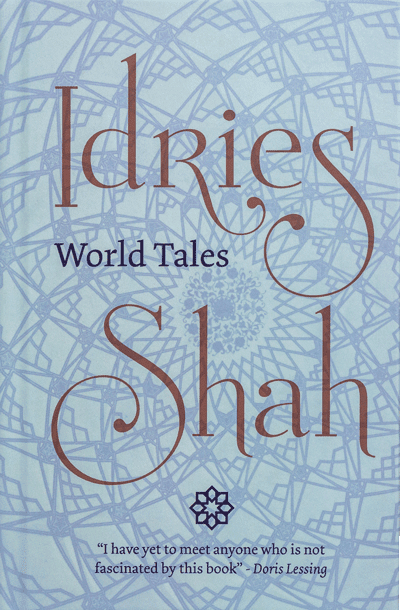What can account for the durability and persistence of certain tales, in different places, through the ages? How can it be that the same story is found in Scotland and also in Pre-Columbian America? Was the tale of Aladdin and his wondrous lamp really taken from Wales to the ancient East and, if so, when and by whom?
These questions and more are answered in Idries Shah’s remarkable volume World Tales, which is subtitled, The extraordinary coincidence of stories told in all times, in all places. It is an anthology of 65 enduring folk tales, some famous, others virtually unknown, from every part of the globe.
Each story is preceded by a short introduction giving a brief history of the tale’s literary mutations, and that also remark on the astonishing similarities of other versions in different parts of the world.
No ordinary collection of fables, World Tales is the result of extensive research that led Shah to conclude that there is a certain basic fund of human fictions, which recur again and again throughout the world and never seem to lose their compelling attraction.
Chosen as a US Book of the Month Club feature selection
‘I have yet to meet anyone who is not fascinated by this book.’
Doris Lessing
‘A delightful book, filled with stories that will appeal to the eye, mind and especially the heart.’
New Frontier
‘An enchanting volume equally interesting on the levels of entertainment, information and art.’
The Courier
‘This is the book that turned my interest as an adult to folklore and inspired me to take up storytelling.’
Norah Dooley, author and storyteller
Tale/Origin
Tales of a Parrot – India
Dick Whittington and his Cat – England
Don’t Count Your Chickens – Spain
The Hawk and the Nightingale – Greece
Cecino the Tiny – Tuscany
Her Lover’s Heart – India
The New Hand – United States
The Mastermaid – Norway
The Hermit – France
The Maiden Wiser than the Tsar – Serbia
The Travelling Companion – Denmark
The Riddles – Turkestan
The Grateful Animals and the Ungrateful Man – Tibet
The Value of a Treasure Hoard – China
Patient Griselda – England
How Evil Produces Evil – Italy
The Ghoul and the Youth of Ispahan – Persia
The Pilgrim from Paradise – India
The Blind Ones and the Matter of the Elephant – Afghanistan
Anpu and Bata – Egypt
God is Stronger – Madagascar
The Happiest Man in the World – Uzbekistan
The Gorgon’s Head – Greece
The Brahmin’s Wife and the Mongoose – India
The Magic Bag – Morocco
Catherine’s Fate – Sicily
The Desolate Island – Palestine
Gazelle Horn – Tibet
Tom Tit Tot – England
The Silent Couple – Arabia
Childe Rowland – Scotland
The Tale of Mushkil Gusha – Middle East
The Food of Paradise – Central Asia
The Lamb with the Golden Fleece – Europe
The Man with the Wen – Japan
The Skilful Brothers – Albania
The Algonquin Cinderella – North American Indian
The Kindly Ghost – Sudan
The Ass in Pantherskin – India
The Water of Life – Germany
The Serpent – Albania
The Wonderful Lamp – Italy
Who Was the Most Generous? – England
Cupid and Psyche – Italy
The Royal Detectives – Egypt
Conflict of the Magicians – Wales
False Witnesses – Germany
The Cobbler Who Became an Astrologer – Persia
The Two Travellers – China
The Fisherman and his Wife – Germany
Impossible Judgement – Spain
Hudden and Dudden and Donald O’Neary – Ireland
Riquet with the Tuft – France
The Lost Camel – India
The Beggar and the Gazelle – Middle East
The Apple on the Boy’s Head – Iceland
The Boots of Hunain – Arabia
The Three Caskets – England
The Land Where Time Stood Still – Romania
The Man Turned into a Mule – Spain
The Fox and the Hedgehog – Greece
The Bird Maiden – Arabia
The Slowest May Win the Race – Thailand
The Three Imposters – Spain
Occasion – Sicily
Idries Shah was born in India in 1924 into an aristocratic Afghan family. He was an author and teacher in the Sufi tradition and is considered one of the leading thinkers of the 20th century.
Shah devoted his life to collecting, translating and adapting key works of Sufi classical literature for the needs of the West. Called by some 'practical philosophy' - these works represent centuries of Sufi and Islamic thought aimed at developing human potential. His best-known works include the seminal book The Sufis, several collections of teaching stories featuring the ‘wise fool’ Nasrudin, Reflections and Knowing How to Know.
Shah's corpus - over three dozen books on topics ranging from psychology and spirituality to travelogues and cultural studies - have been translated into two dozen languages and have sold millions of copies around the world. They are regarded as an important bridge between the cultures of East and West.
